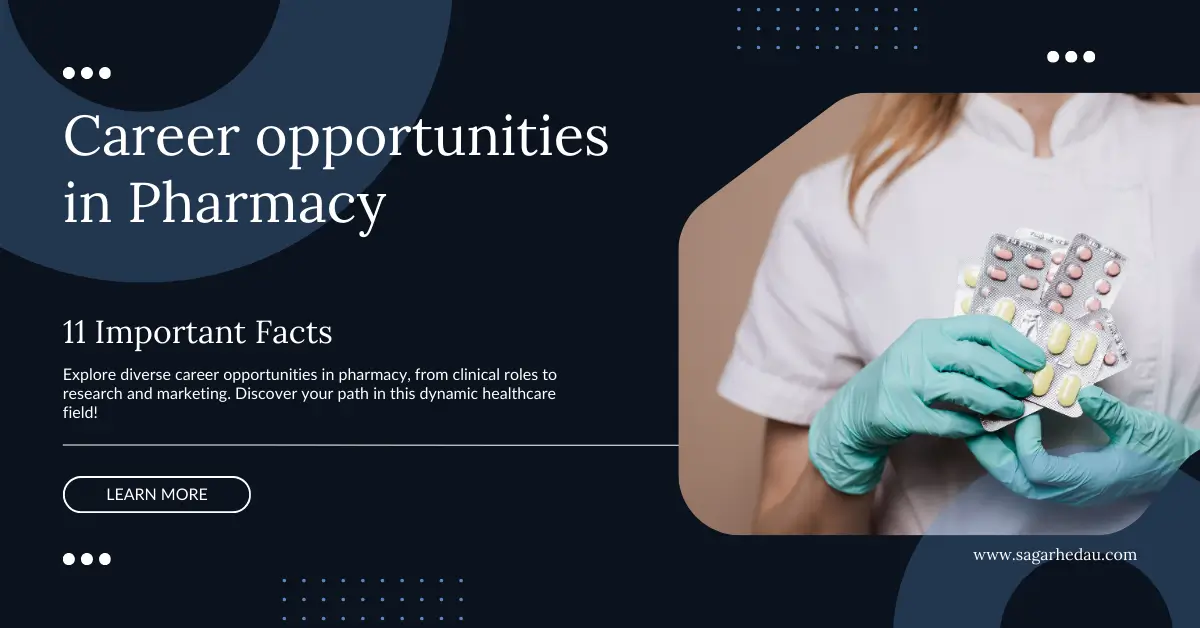The field of pharmacy offers a dynamic blend of science, innovation, and patient care, making it one of the most versatile sectors in healthcare. With advancements in pharmaceuticals and a growing emphasis on research and quality control, pharmacy graduates can explore diverse roles—from drug development to public health.
Whether you’re drawn to research, regulatory affairs, or direct patient interaction, career opportunities in pharmacy promise growth, stability, and the chance to impact lives. Let’s delve into the pathways, opportunities, and rewards this field holds.
How to Start a Career in Pharmacy?
Begin with a strong foundation in science (Physics, Chemistry, Biology) at the 10+2 level. Pursue a Diploma in Pharmacy (D.Pharm) for entry-level roles or a Bachelor of Pharmacy (B.Pharm) for broader opportunities. Clearing exams like GPAT (Graduate Pharmacy Aptitude Test) can secure admission to top institutes. Internships and licencing exams (e.g., state pharmacist registration) are crucial. Specialisations via M.Pharma or Pharm.D. enhance expertise for advanced roles in research, clinical practice, or academia.
Department of Pharmaceutical Sciences – RTM Nagpur University
Career Opportunities in Pharmacy
The sector spans clinical, industrial, and regulatory domains. Roles include community pharmacists, hospital pharmacists, research scientists, and regulatory affairs officers. Emerging fields like pharmacovigilance and biopharmaceuticals offer niche opportunities. With global healthcare demands rising, pharmacists contribute to drug safety, patient counselling, and innovative therapies, ensuring a recession-resistant career with global mobility.
Drug Inspector
Drug Inspectors ensure compliance with pharmaceutical regulations, inspecting manufacturing units, and monitoring drug quality. A B.Pharm or M.Pharm degree is required, followed by clearing exams like the UPSC/state public service commissions. This role demands attention to detail and knowledge of laws like the Drugs and Cosmetics Act, safeguarding public health against substandard medications.
Pharmaceutical Manufacturing Specialist
These professionals oversee drug production, ensuring adherence to Good Manufacturing Practices (GMP). Responsibilities include process optimisation, quality control, and troubleshooting production issues. A B.Pharm or M.Pharm in Pharmaceutical Technology is ideal. The role is critical in meeting global demand for safe, efficacious medicines.
Pharmaceutical Marketing Manager
This role bridges science and business, promoting drugs to healthcare professionals. It requires a blend of pharmacy knowledge and marketing skills, often pursued via an MBA after B.Pharm. Tasks include market research, brand management, and strategising launches. Salaries are lucrative, reflecting the commercial impact of effective drug marketing.
Clinical Research Associate (CRA)
CRAs manage clinical trials, ensuring protocols comply with ethical and regulatory standards. A B.Pharm or M.Pharm, coupled with certification in clinical research, is preferred. This role demands analytical skills and offers opportunities to contribute to groundbreaking therapies.
Pharmacist
Pharmacists dispense medications, advise patients, and manage inventory in retail, hospitals, or clinics. A D.Pharm or B.Pharm with state licensure is mandatory. The role is patient-centric, emphasising safe medication use and health education.
Quality Assurance Specialist
QA Specialists ensure products meet regulatory and quality benchmarks. They review manufacturing processes, conduct audits, and maintain documentation. A B.Pharm or M.Pharm in Quality Assurance is ideal, with roles vital to maintaining industry credibility.
Education Pathways
The pharmacy education landscape in India offers multiple pathways, each with distinct durations and fee structures. Below is a detailed breakdown of the Diploma in Pharmacy (D.Pharm), Bachelor of Pharmacy (B.Pharm), Master of Pharmacy (M.Pharm), and Pharm.D (Doctor of Pharmacy) programs:
Diploma in Pharmacy (D.Pharm)
- Duration: 2 years (includes 500+ hours of internship)
- Fees: ₹10,000 – ₹1,00,000 total (varies by institution)
- Example: Delhi Pharmaceutical Sciences and Research University (DPSRU) charges ~₹1.32 Lakh (including hostel fees).
Diploma in Pharmacy (D.Pharm) programs in India offer varying fee structures depending on institution type and location. Below is a detailed overview of costs and notable colleges:
State-wise Annual Fee Comparison :
| State | Government Colleges | Private Colleges |
|---|---|---|
| Maharashtra | ₹52,000 | ₹1,47,000 |
| Delhi NCR | ₹25,000 | ₹1,69,000 |
| West Bengal | ₹57,000 | ₹1.45 Lakh |
| Karnataka | ₹84,000 | ₹1.28 Lakh |
| Uttar Pradesh | ₹59,000 | ₹80,000 |
Top D.Pharm Colleges
Government Institutions:
- AIIMS Delhi: ₹1.32 Lakh (total with hostel)
- Delhi Pharmaceutical Sciences and Research University: ₹40,000 (total)
- Government Pharmacy College, Bangalore: ₹8,000/year
- Jadavpur University, Kolkata: ₹5,000/year
Private Institutions:
- Saveetha Institute, Chennai: ₹1.2 Lakh (total)
- Parul University, Gujarat: ₹2 Lakh (total)
- St. John’s Pharmacy College, Bangalore: ₹1.7 Lakh/year
- Eminent College of Pharmaceutical Technology, Kolkata: ₹57,000 (total)
Key Considerations for College Selection
- Accreditation: Ensure PCI recognition.
- Placements: Top recruiters include Sun Pharma, Cipla, and Himalaya Drug Company.
- Infrastructure: Prioritize colleges with labs and industry partnerships.
- Scholarships: Available in many government colleges to reduce costs.
Fees may vary annually – verify directly with institutions before applying.
Bachelor of Pharmacy (B.Pharm)
- Duration: 4 years (8 semesters)
- Fees:
- Government colleges: ₹15,000 – ₹1.25 Lakh total
- Private colleges: ₹40,000 – ₹2.6 Lakh per year
Bachelor of Pharmacy (B.Pharm) programs in India have varying fee structures depending on whether the institution is government-funded or private. Below is a detailed breakdown of costs, additional charges, and key considerations:
Fee Breakdown (Per Year)
| Component | Government Colleges | Private Colleges |
|---|---|---|
| Tuition Fees | ₹5,000 – ₹1.35 Lakh | ₹70,000 – ₹2.5 Lakh |
| Admission Fees | ₹1,000 – ₹25,000 | ₹15,000 – ₹30,000 |
| Hostel & Mess Fees | ₹50,000 – ₹2 Lakh | ₹1 Lakh – ₹3 Lakh |
| Lab/Practical Fees | ₹3,000 – ₹5,000 | ₹5,000 – ₹15,000 |
Top Government Colleges
- Jamia Hamdard, Delhi: ₹1.35 Lakh/year
- Annamalai University, Tamil Nadu: ₹1.5 Lakh/year
- Government Pharmacy College, Bengaluru: ₹8,000/year
- Kumaun University, Uttarakhand: ₹56,013/year
Top Private Colleges
- Manipal College of Pharmaceutical Sciences: ₹5 Lakh/year
- Amity University, Noida: ₹2.2 Lakh/year
- Saveetha Institute, Chennai: ₹2.1 Lakh/year
- VISTAS School of Pharmaceutical Sciences, Chennai: ₹2.02 Lakh/year
Key Factors Influencing Fees
- Location: Tier-1 cities (e.g., Delhi, Mumbai) have higher fees than Tier-2/3 cities.
- Infrastructure: Private colleges with advanced labs and industry partnerships charge more.
- Entrance Exams: NEET, GPAT, or state CET scores may reduce fees via scholarships.
- Placements: Colleges with strong industry ties (e.g., Sun Pharma, Cipla recruiters) often have higher fees.
Master of Pharmacy (M.Pharm)
- Duration: 2 years
- Fees:
- Government colleges: ₹30,000 – ₹1 Lakh per year
- Private colleges: ₹2 Lakh – ₹10 Lakh per year
Master of Pharmacy (M.Pharm) programs in India have a diverse fee structure depending on the type of institution (government or private) and location. Below is an overview of the fees and some notable colleges offering M.Pharm courses.
Top Government Colleges and Fees
| College Name | Annual Fees |
|---|---|
| Madras Medical College | ₹47,000 |
| National Institute of Pharmaceutical Education and Research (NIPER) | ₹1.9 Lakh |
| Jamia Hamdard | ₹3.7 Lakh |
| Central University of Punjab | ₹42,700 |
| Pt. Bhagwat Dayal Sharma Post Graduate Institute of Medical Sciences | ₹20,000 – ₹59,000 |
Top Private Colleges and Fees
| College Name | Annual Fees |
|---|---|
| BITS Pilani | ₹9.3 Lakh |
| Sri Ramachandra Institute of Higher Education and Research | ₹3 Lakh |
| Annamalai University | ₹2.4 Lakh |
| JSS College of Pharmacy | ₹2.3 Lakh – ₹2.9 Lakh |
| Manipal College of Pharmaceutical Sciences | ₹4.2 Lakh – ₹5 Lakh |
Pharm.D (Doctor of Pharmacy)
The Doctor of Pharmacy (Pharm.D) program in India is a professional doctoral degree focusing on clinical pharmacy and patient care. Here’s an overview of the course details, fee structure, and top colleges:
- Duration: 6 years (including 5 years of academic study and 1 year of internship)
- Eligibility: Candidates must have completed Class 12 with a minimum of 50% aggregate marks in the Science stream (Physics, Chemistry, and Biology/Mathematics). Some institutions may require entrance exam scores for admission.
Top Pharm.D Colleges and Fees
Government Colleges
- Annamalai University: Approx. ₹1.59 Lakhs total
- Government College of Pharmacy, Amaravati: Approx. ₹2.4 Lakhs total
- Government College of Pharmacy, Aurangabad: Approx. ₹2.4 Lakhs total
Private Colleges
- Maharishi Markandeshwar University: Approx. ₹8.7 Lakhs total
- Parul University: Approx. ₹13.33 Lakhs total
- Sri Ramachandra Institute of Higher Education and Research: Approx. ₹9 Lakhs total
- Manipal College of Pharmaceutical Sciences: Approx. ₹10 – 25 Lakhs total
Comparative Overview
| Course | Duration | Total Fees Range (₹) |
|---|---|---|
| D.Pharm | 2 years | 10,000 – 1.32 Lakh |
| B.Pharm | 4 years | 1.5 Lakh – 10 Lakh |
| M.Pharm | 2 years | 60,000 – 20 Lakh |
| Pharm.D | 6 years | 2.3 Lakh – 9.6 Lakh |
Key Notes:
- Admission Criteria: Most courses require entrance exams (NEET, GPAT, state CETs) or merit-based selection.
- Internships: Mandatory in D.Pharm (500+ hours) and Pharm.D (1 year).
- Fee Variability: Government institutions are generally cheaper than private ones.
Top Colleges in India
- Jamia Hamdard University, Delhi
- Birla Institute of Technology & Science (BITS Pilani)
- Manipal College of Pharmaceutical Sciences
- National Institute of Pharmaceutical Education and Research (NIPER)
- Institute of Chemical Technology, Mumbai
Average Salary Table [AmbitionsBox]
Job Title Average Salary (per year) Salary Range Pharmacist ₹1.84 LPA ₹1.5 – ₹34 LPA Drug Inspector ₹6 – ₹12 LPA Varies by experience and location Clinical Research Associate ₹4 – ₹8 LPA Up to ₹10 LPA for experienced Quality Assurance Specialist ₹3 – ₹7 LPA Up to ₹10 LPA for experienced Pharmaceutical Marketing Manager ₹6 – ₹15 LPA Up to ₹20 LPA for senior roles
To Conclude
In conclusion, a career in pharmacy offers a diverse range of opportunities that extend far beyond traditional roles. With the evolving landscape of healthcare and pharmaceuticals, professionals can explore various paths, including clinical practice, regulatory affairs, research, quality assurance, and marketing.
As the demand for healthcare services continues to grow, pharmacists and pharmacy professionals are increasingly recognized as vital contributors to patient care and public health. Whether you are just starting your journey or looking to advance your career, the pharmacy field presents a wealth of possibilities for personal and professional growth. Embrace the opportunities that await you in this dynamic industry!


